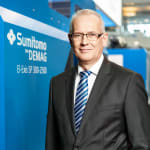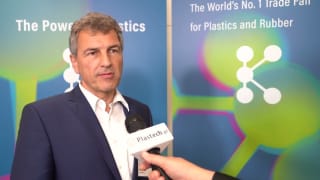
Despite an extremely difficult trading environment, the Sumitomo (SHI) Demag Group generated a sales turnover of EUR 762 million last year. This was only six percent lower than the historic accomplishments reported in 2021, when the Group achieved its highest turnover to-date alongside numerous other customer and employee satisfaction successes. CEO Gerd Liebig cites the dramatic impact of material availability and costs as the rationale for the sideways development, reporting that this inevitably had a negative effect on the company’s overall sales and profitability.
“Passing on these monthly cost increases to customers would hardy have been considered reasonable. We very much hope for more stable supply chains in 2023, as this will enable us to offset any cost increases with higher production efficiency,” states Mr. Liebig. Referencing the Wiehe site, he cites their six-year production model geared totally towards all-electric machines as the epitome of successful cost reduction and efficiency.
Navigating the highs and lows
Globally, the key sector markets experienced a 30 percent slump in 2022. Although automotive and consumer performed below expectations overall - attributed mainly to the material, energy and raw materials cost burdens - Sumitomo (SHI) Germany’s market share in packaging, medical and the automotive sectors continued to increase, notes the CEO. Specifically, all-electric machine production reached another high point, with Mr. Liebig pleased to highlight that every fourth all-electric machine produced in Europe is now an IntElect.
With the launch of two high-performance machines in the company’s all-electric series - PAC-E in 2022, and this year the IntElect S - Sumitomo (SHI) Demag is on track to continue this success story, announces Mr. Liebig. Both new machines cater specifically to the high-speed, high-precision injection moulding segments, ranging from caps to thin-walled products. “Our complete portfolio of all-electric machines now covers all market requirements - from the highest energy efficiency and precision to the fastest and most productive cycle times. Given the current developments in electricity costs, the future demands for all-electric systems in both the packaging industry and the consumer segment is anticipated to be very strong,” he declares.
The CEO anticipates that by 2024 at the latest, every second machine built in Europe will be fully electric. Putting into context his confidence, he explains: “In view of the rising energy prices, the ROI for almost all applications has fallen drastically. This makes the investment in all-electric machines not only affordable, but now absolutely future-proof." Aligned to this is the growing demand for automation, pointing to another key company milestone. Following the market launch of the SAM-C robotics solution and the availability of the SAM-S in 2023, Sumitomo (SHI) Demag continues to add to its total integration and automation competence, reports Liebig.

Gerd Liebig, Group CEO of Sumitomo (SHI) Demag Plastics Machinery
Southern Europe market escalates
Reflective of the evolving manufacturing landscape in Europe, the Group observed significant activity in Southern and Southeastern countries, notably substantial growth in the Czech Republic, Hungary and Italy. All locations where Sumitomo (SHI) Demag has invested extensively in new subsidiaries in recent years.
Liebig attributes this significant increase in market share to the company’s enhanced presence and local service and technology application expertise, as well as widespread adoption of all-electric machines. Additionally, the CEO is thrilled to announce the completion of its service digitization concept. “This digitization roadmap is also now largely implemented in our products and production,” he affirms.
Looking ahead to this financial year, Liebig expects material availability to relax significantly in 2023 and a slight easing on the massive cost pressures. However, the challenges driven by higher wages, electricity prices, high inflation costs, rising microchip costs, along with other cost considerations - including transportation, container shipments and sheet metal and steel costs - all remain prevalent.
“Currently, the international markets remain very weak as a result of the continuing uncertainties, high inflation and energy prices, as well as the ongoing cost increases in materials and raw materials," explains Liebig. “In America and Europe, we expect market demand to increase from May. Likewise in China, although amendments to their domestic corona policies will likely impact medical and packaging. Pressures in the automotive industry are likely to carry into this business year too.”
Now entering its fifth consecutive year of challenges and market crisis, the CEO is resolute that the company’s values continue to endure: “To get through this crisis in solidarity. With this unified outlook I am optimistic given the intense popularity of our machines, that market interest, market share and movement towards sustainability and digitization will continue in an upward direction.”




